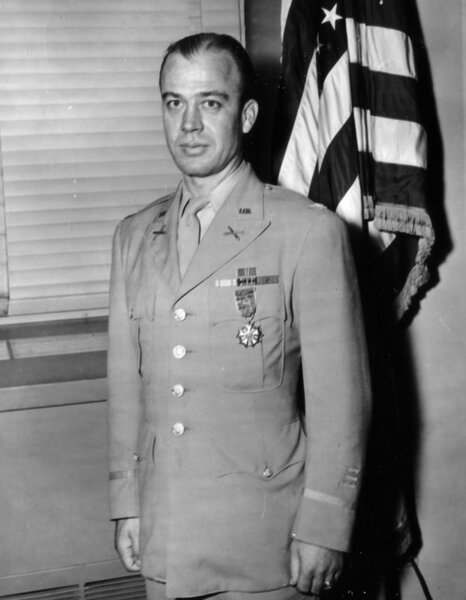William Allen "Billy" Harris

COL in Special Plans Branch, 12th US Army Group
ASN#18976
Born 1911 in Phillippines, Died 1986
Other residence(s): San Antonio, TX
United States Army, European Theatre of Operations
College education before the war: VMI; West Point
William Harris was born on February 3, 1911, in Iloilo, Philippines, where his father was serving as an Army officer; he was the younger of two sons. His parents had eloped in 1908 several weeks after meeting at a "post hop" at Fort Sam Houston in San Antonio. Lulu was from San Antonio, and Hunter was stationed there; it would always represent home base for them and for Billy as well. (It was at Fort Sam Houston that Lulu introduced Dwight D. Eisenhower, then a young Army lieutenant, to his future wife, Mamie Doud, in 1915.)
The family was living in San Antonio when Billy started high school; he graduated from Main Avenue High School there in 1927. His yearbook reports that he was an "exceptional student" and a "wow" on hockey skates. He went on to study at Virginia Military Institute. But Billy's older brother (Hunter Harris, Jr.) was in the class of 1932 at West Point, and Billy eventually followed him there, graduating in 1933.
After earning his commission, he served in several artillery units at Fort Benning in Georgia and Fort Sill in Oklahoma. An outstanding horseman, he was named to compete in the 1940 Olympics on the Army equestrian team. Unfortunately the war intervened and those Olympics were cancelled.
Along the way he married Harriet Deland Smith; they would have two daughters: Harriet and Elizabeth.
He had earned the rank of CPT in 1940 and was promoted to LTC early in World War II. In 1943, he was assigned to a section that planned cover and deception operations, such as Operation Fortitude, related to the D-Day invasion. He is credited, along with his subordinate Ralph Ingersoll, with developing the specifics of the plan to create the deception unit which became the Ghost Army. In The Ghost Army of World War II, Rick Beyer describes their collaboration: "While Ingersoll was full of wild, pie-in-the-sky ideas, Harris had the military training and discipline needed to implement deception in a way that could actually work."
Meanwhile, his brother Hunter was following a parallel track. He had become a pilot and a bomber commander, and the two had a chance to meet up in England when both Colonels were stationed there, early in 1944.
Billy was part of the forces to arrive at the Normandy Beaches on D-Day. And he continued service in the European theatre as part of the Special Plans Branch, 12th US Army Group, until May 1945. He spent several more years working on military deception at the Pentagon and early in 1949 was assigned the command of the 77th Field Artillery Battalion in Japan.
That assignment was cut short in 1950 when he was asked to command the 7th Cavalry during the Korean War. By then known as "Wild Bill," he rode in a jeep with a weather-beaten cavalry saddle mounted on the hood, a nod to the unit's legacy. A 1964 article in the San Antonio Light describes one of his experiences in Korea as follows: He "led the force on a 120-mile push through armed resistance in Korea in 21 hours—a feat now recorded as the US Army's longest sustained advance against an armed army." He was awarded the Distinguished Service Cross for his service in Korea.
After the war he studied and taught at the Army War College, and then took command of a succession of artillery units in the US and Germany. In 1964 he was able to return to his beloved San Antonio as deputy commanding general of the 4th Army and commanding general of Fort Sam Houston. He served in those roles until his retirement, with the rank of Major General, in 1966. (His brother Hunter, also a general, retired in 1967 after a three-year stint as Commander of Pacific Air Forces.)
He remained in San Antonio and used his administrative skills in a number of local organizations: the San Antonio Conservation Society, Bexar County Historical Commission, Texas Old Missions and Forts Restoration Association, the USO, Goodwill, Boy Scouts, and the Chamber of Commerce.
According to his obituary, "by the mid-1970s, Harris had become a prominent local preservationist and served as chairman of the Bexar County Historical Commission."
He also regularly organized reunions for the West Point class of 1933.
Billy's wife Harriet died late in 1985, and Billy followed her less than four months later, dying on March 4, 1986. He is buried at Fort Sam Houston National Cemetery.
Sources:
1920 census
https://www.ancestry.com/discoveryui-content/view/19799629:6061?ssrc=pt&tid=13675528&pid=18754384726
1927 high school yearbook
1940 census
https://www.ancestry.com/discoveryui-content/view/89940952:2442?ssrc=pt&tid=13675528&pid=18754384726
1944 article in San Antonio Light (TX) about his meeting his brother in England
1950 article in San Antonio Express (TX) re his service in Korea
1951 article in San Antonio Express (TX) re his next assignment after TX
1964 interview in San Antonio Light (TX); contains biographical details
1966 US Select Military Register
1966 article in San Antonio Light re his retirement
1986 Find a Grave record; includes obituary
https://www.findagrave.com/memorial/759761/william-allen-harris
1986 US Veterans' Gravesites
https://www.ancestry.com/discoveryui-content/view/1282177:8750?ssrc=pt&tid=13675528&pid=18754384726
Hall of Valor Project; his military awards